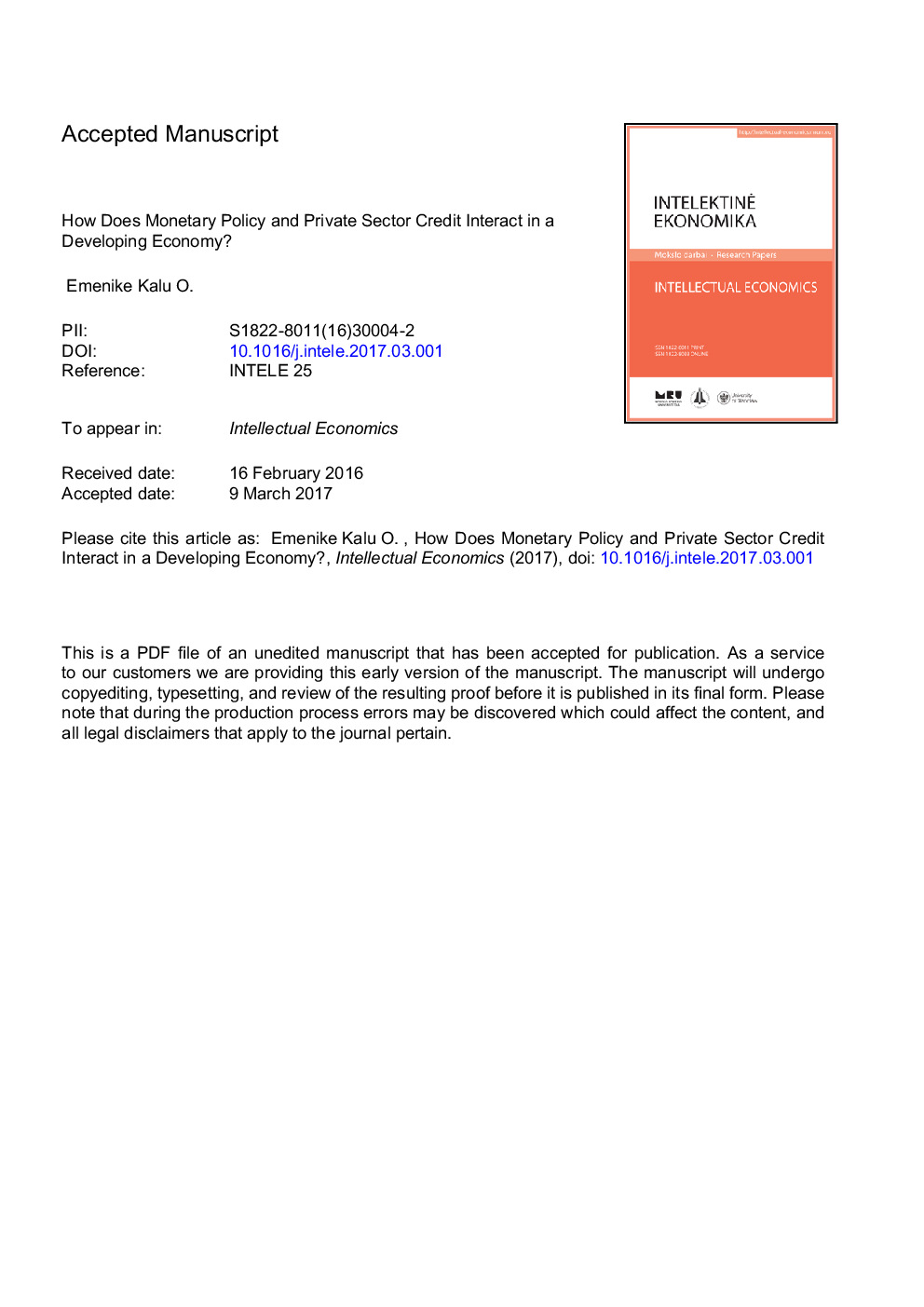| کد مقاله | کد نشریه | سال انتشار | مقاله انگلیسی | نسخه تمام متن |
|---|---|---|---|---|
| 7407882 | 1481338 | 2016 | 17 صفحه PDF | دانلود رایگان |
عنوان انگلیسی مقاله ISI
How does monetary policy and private sector credit interact in a developing economy?
ترجمه فارسی عنوان
چگونه سیاست پولی و اعتبار بخش خصوصی چگونه در یک اقتصاد در حال توسعه تاثیر می گذارد؟
دانلود مقاله + سفارش ترجمه
دانلود مقاله ISI انگلیسی
رایگان برای ایرانیان
کلمات کلیدی
ترجمه چکیده
این مقاله ماهیت رابطه بین سیاست پولی و اعتبار بخش خصوصی را بررسی می کند و همچنین تأثیر شکست ساختاری بر رابطه با استفاده از باتری تست های اقتصاد سنجی بر روی داده های نیجریه را ارزیابی می کند. نتایج رگرسیون تلفیقی نشان می دهد شواهدی از رابطه بلندمدت بین سیاست پولی و اعتبار بخش خصوصی است. برآورد از آزمون های پایداری پارامتر طولانی مدت، با وجود شکست های ساختاری، همپوشانی را پشتیبانی می کند. به طور مشابه، نتایج مدل اصلاح خطا نشان می دهد که تغییر در اعتبار اثرات مثبت و معکوس کوتاه مدت بر تغییرات سیاست پولی دارد. نتایج حسابداری نوآوری نیز پشتیبانی می کند تا نشان دهد که نوآوری ها در اعتبار بر سیاست پولی اثر می گذارد. تجزیه و تحلیل علیت گرنجر، علیت یک طرفه را از اعتبار به سیاست پولی نشان می دهد. نتیجه اصلی این یافته ها این است که اعتبار بخش خصوصی یک کانال موثر برای انتقال سیاست پولی در نیجریه است. بنابراین توصیه می شود که مقامات پولی در کشورهای در حال توسعه اعتبار را به عنوان کانال اصلی برای اجرای سیاست های پولی در نظر بگیرند.
موضوعات مرتبط
علوم انسانی و اجتماعی
اقتصاد، اقتصادسنجی و امور مالی
اقتصاد، اقتصادسنجی و مالیه (عمومی)
چکیده انگلیسی
This paper evaluates the nature of relationship between monetary policy and private sector credit as well as the impact of structural break on the relationship by applying a battery of econometric tests on Nigeria data. The cointegrating regression results reveal evidence of long-run relationship between monetary policy and credit to private sector. Estimates from the long-run parameter stability tests support cointegration in the presence of structural breaks. Similarly, error correction model results show that changes in credit have positive and significant short-term effects on changes in monetary policy. The results of innovation accounting also provide support to show that innovations in credit have impact on monetary policy. Granger causality analysis exhibits unidirectional causality from credit to monetary policy. The key implication of the findings is that credit to the private sector is an effective channel for monetary policy transmission in Nigeria. It is recommended therefore that monetary authorities in developing countries should consider credit as a major channel for implementing monetary policies.
ناشر
Database: Elsevier - ScienceDirect (ساینس دایرکت)
Journal: Intellectual Economics - Volume 10, Issue 2, August 2016, Pages 92-100
Journal: Intellectual Economics - Volume 10, Issue 2, August 2016, Pages 92-100
نویسندگان
Kalu O. Emenike,
